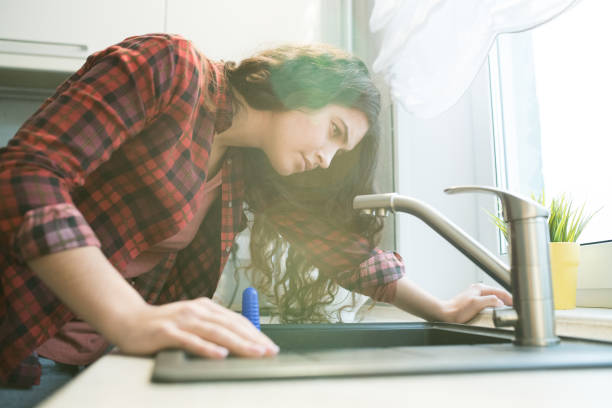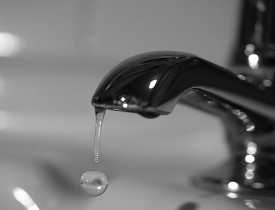Discovering the Significance of Repairing a Leaking Faucet
Discovering the Significance of Repairing a Leaking Faucet
Blog Article
Are you on the lookout for insight concerning What Causes Leaky Faucets & How To Fix Them?

Leaking faucets may feel like a minor hassle, however their effect exceeds simply the annoyance of the sound. From drainage to sustaining unneeded monetary costs and wellness dangers, neglecting a leaking faucet can lead to different repercussions. In this post, we'll explore why it's important to address this common household concern immediately and successfully.
Waste of Water
Environmental Influence
Leaking faucets add substantially to water wastefulness. According to the Environmental Protection Agency (EPA), a solitary faucet dripping at one drip per secondly can waste greater than 3,000 gallons of water annually. This not just stress water sources yet likewise influences communities and wildlife based on them.
Step-by-Step Guide to Dealing With a Dripping Faucet
Tools Required
Before trying to fix a trickling tap, collect the needed tools, including an adjustable wrench, screwdrivers, substitute components (such as washers or cartridges), and plumber's tape.
Common Faucet Issues and Their Solutions
Recognize the kind of faucet and the specific problem causing the drip. Typical troubles consist of worn-out washing machines, corroded shutoff seats, or damaged O-rings. Refer to manufacturer guidelines or online tutorials for detailed assistance on fixings.
Financial Expenses
Raised Water Expenses
Past the environmental effect, leaking faucets can blow up water expenses substantially. The accumulated wastage gradually converts right into higher energy expenses, which might have been prevented with prompt repair work.
Possible Residential Property Damages
In addition, long term trickling can bring about harm to components and surface areas bordering the tap. Water build-up can trigger staining, rust, and even structural concerns if left neglected, leading to added fixing expenses.
Health and wellness Concerns
Mold And Mildew and Mold Growth
The consistent presence of moisture from a dripping tap produces an optimal setting for mold and mold development. These fungi not only endanger interior air high quality however also present health threats, especially for people with breathing problems or allergic reactions.
Waterborne Diseases
Stagnant water in trickling faucets can end up being a breeding place for bacteria and other virus, increasing the danger of waterborne illness. Impurities such as Legionella bacteria flourish in stagnant water, potentially resulting in severe health problems when consumed or inhaled.
DIY vs. Professional Repair work
Benefits and drawbacks of Do It Yourself Fixing
While some might try to fix a leaking faucet themselves, DIY repair work come with their very own collection of difficulties. Without correct knowledge and devices, DIY attempts can aggravate the concern or result in incomplete repair work, prolonging the trouble.
Benefits of Working With an Expert Plumber
Hiring a specialist plumber guarantees that the underlying source of the dripping tap is dealt with properly. Plumbing technicians have the expertise and tools to diagnose and fix faucet concerns efficiently, saving time and decreasing the risk of further damage.
Ecological Duty
Specific Contribution to Conservation
Taking obligation for taking care of leaking faucets aligns with wider initiatives toward water conservation and ecological sustainability. Every individual's activities collectively make a substantial impact on preserving precious resources.
Sustainable Living Practices
By focusing on timely repairs and embracing water-saving practices, individuals contribute to lasting living methods that benefit both present and future generations.
Preventive Measures
Normal Maintenance Tips
To prevent trickling faucets, execute routine upkeep such as cleaning up aerators, examining for leakages, and replacing damaged parts without delay. Additionally, take into consideration installing water-saving tools or upgrading to much more reliable components.
Significance of Prompt Fixes
Dealing with leaking taps as quickly as they're noticed avoids additional water wastefulness and possible damages, inevitably conserving both water and money over time.
Effect On Home Value
Understanding of Well-Maintained Building
Keeping a property in good condition, including addressing upkeep concerns like trickling taps, enhances its regarded value and worth among possible customers or renters.
Impact on Resale Worth
Features with well-kept plumbing components, consisting of taps, command higher resale values in the realty market. Dealing with trickling faucets can contribute to a positive impact during building examinations and arrangements.
Verdict
Resolving a dripping faucet goes beyond mere convenience; it's a vital step toward preserving water, lowering economic prices, and securing health and wellness and residential or commercial property. Whether via do it yourself fixings or expert assistance, acting to repair trickling faucets is a little yet impactful way to promote liable stewardship of resources and contribute to a healthier, a lot more lasting future.
How to Fix a Dripping or Leaky Faucet
A leaking faucet is one of the most common problems that homeowners encounter, but it being commonplace doesn’t make it any less annoying. The constant drip drip drip of a leaking bathtub faucet, showerhead, or sink tap can disturb your home’s serenity. Left neglected, a dripping faucet can also result in higher water bills and discoloration or mold growth in your sink or plumbing fixtures.
Fortunately, you don’t have to be a trained plumber to know how to stop a dripping faucet. With some basic tools, replacement parts, and a little patience, leaky faucet repair is a breeze. In this article, we’ll explain what causes dripping faucets and how you can fix them.
What Causes a Leaking Faucet?
Kitchen and bathroom faucets come in all manner of designs, but most involve some combination of valves, O-rings, seals, and washers. The O-ring is usually the weakest link, but any one of these pieces can wear down over time. Heat, moisture, temperature fluctuations, minerals, mold, and movement can contribute to warping and corrosion, breaking the watertight seal. This just comes with the territory of being a homeowner. Everything is always subject to wear and tear, and some component parts of your appliances and fixtures need to be replaced on occasion. At least replacement O-rings are cheap!
More rarely, dripping faucets can be a symptom of excessively high water pressure. Were this the case in your home, you would probably notice that the leak is not isolated to one faucet. Water pressure issues are harder to resolve on your own. We recommend contacting a professional plumber if you suspect your water pressure is too high.
How to Fix a Dripping Faucet
Pipe wrench or monkey wrench Allen wrench set Screwdrivers Old towel or rag Shut off the water.
Before you do anything, you need to turn off the water to keep from drenching your kitchen or bathroom. You should find a valve under the sink and against the wall. Once you’ve turned this valve, try turning the faucet on to confirm that the water source has been cut off.
If you can’t locate your local valve for the faucet you’re working on, you can always shut off the water to the house at the main valve. Of course, this will prohibit anyone from using the sinks, showers, or toilets while you’re working on the faucet that’s giving you trouble.
Plug or block the drain.
You’ll be disassembling the faucet and removing some small bits of hardware. Plug the drain with a stopper or rag to avoid the possibility of a small screw falling into your P-trap.
Take apart the faucet assembly.
There are several varieties of kitchen and bathroom faucets, each with its own manner of assembly. For detailed instructions on how to disassemble your faucet, you can refer to the fixture’s manual or contact the manufacturer. If you know whether you have a ball, disc, cartridge, or compression faucet, you can find detailed schematics online.
In general, you need to begin by removing the faucet handles. You might notice a small screw that you’ll need to remove with a screwdriver or Allen wrench. If you don’t see any visible securing hardware, it’s likely hidden under a decorative cap that can be unscrewed or popped off with flathead screwdriver.
Remove each piece methodically, consulting a schematic when necessary. Take notes or arrange the pieces in such a way to make it easier to correctly reassemble the faucet later.
Remove the cartridge.
Once you’ve removed the handles and securing hardware, you should be able to remove the valve cartridge or stem. Some cartridges will slide right out. Other faucet models will require you to loosen a nut with a pipe wrench before you can remove the valve stem.
Examine the exposed hardware.
With the cartridge or stem removed, inspect the component parts. Check the rubber O-rings for wear and tear. Also examine the seat washer for corrosion or other damage. These pieces are usually the responsible parties for a dripping faucet, but it’s worth inspecting the other component parts while you have the faucet disassembled.
Find replacement parts.
Once you’ve identified which faucet component has failed, find an identical replacement. Your local hardware store should have O-rings, seat washers, and other standard components in stock. If you have a luxury or uncommon faucet, you may have to contact the manufacturer for a replacement part.
It’s a good idea to take your old parts with you to the hardware store so you can compare them with the store’s inventory and be sure you’re purchasing the correct replacement.
Reassemble the faucet.
With your new parts in hand, reconstruct the faucet and handles. Don’t be tempted to overtighten screws or nuts. You might think this could create a better seal, but it can instead damage or bend a delicate part of the assembly and create a new problem for you.
Turn on the water and test the faucet.
The only thing left to do is test your work. Unplug the sink, turn the water back on, and try the faucet. Congratulate yourself on a job well done!
https://www.libertyhomeguard.com/how-to-fix-a-dripping-or-leaky-faucet/

I am very curious about Leaky Faucets: Why They Happen & What to Do About Them and I'm hoping you liked the blog entry. Do you know another person who is in to the topic? Take a moment to promote it. We take joy in your readership.
Report this page